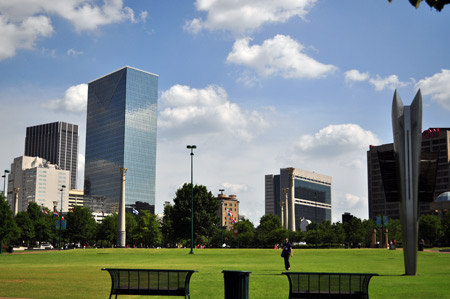I am excited to announce that American Forests is launching a new urban forest program called Community ReLeaf. American Forests Community ReLeaf will directly work with urban communities to first assess and then restore their forests. This work will help develop new information and research about the relevance and importance of urban forests locally and nationally. Reaching geographically distributed communities across the country, American Forests aims to bring national attention to the value of our urban forests and the importance of strategic urban forest restoration to community well-being and ecological health.

Thanks to a generous grant from the Bank of America Charitable Foundation, American Forests Community ReLeaf will be working in five U.S. cities this year, and the project in each city will have a slightly different focus, based on the needs of the local urban forests.
- In Asbury Park, N.J., the American Forests Community ReLeaf project will assess the changes in urban tree cover of the city in the wake of Hurricane Sandy, including the ecosystem benefits that were lost with the loss of the trees. This project will also model scenarios for the future to inform strategic urban forests restoration work to best benefit the local community.
- In Atlanta, Ga., the American Forests Community ReLeaf project will assess the urban forest around schools to calculate the health benefits for children. With changing climates, it is especially important to better understand the role our urban forests play in areas where our children spend such a large percentage of their time.
- In Detroit, Mich., the American Forests Community ReLeaf project will evaluate the ecosystem services provided by the urban forest in Rouge Park, the largest community park and the last sustainable riparian forest in Detroit. In a city that is currently facing many park closures and budget cuts, this park is one of the key remaining areas for environmental education for the surrounding communities. The resulting information can be used to help ensure the protection of this important urban forest into the future for the benefit of city residents.
-

Nashville, Tenn. Credit: Kyle Simourd In Nashville, Tenn., the American Forests Community ReLeaf project will assess public city trees in key areas of Nashville to quantify the economic and health benefits they provide. In a city that is rapidly expanding, this analysis will be critical to help highlight the benefits of the current city trees and inform planning for urban forests and development in order to maintain a sustainable and livable city into the future.
- In Pasadena, Calif., the American Forests Community ReLeaf project will measure the benefits of the city’s public street trees to quantify the economic and health benefits they provide. This analysis will especially focus on air quality benefits of the urban forests in helping to address major challenges for the city: air pollution and smog. Such an assessment will help to inform Pasadena’s future Urban Forest Management Plan.
In each of these cities, American Forests will complete these assessments this spring and summer and will then leverage the information to conduct strategic tree planting projects this fall in areas of need.
Please stay tuned to our Urban Forests website, as we will be posting more information on each project in the following months. And for more details on Community ReLeaf, check out our press release on the program.